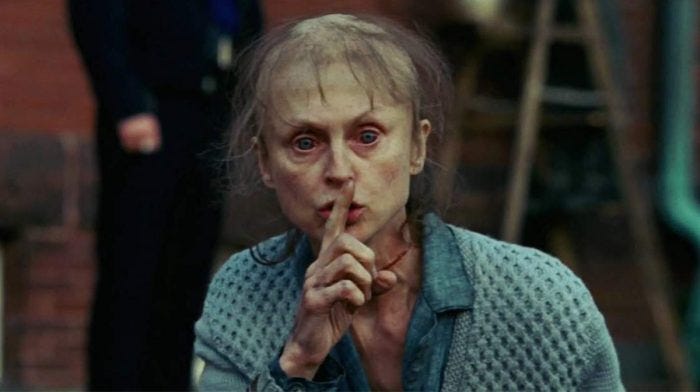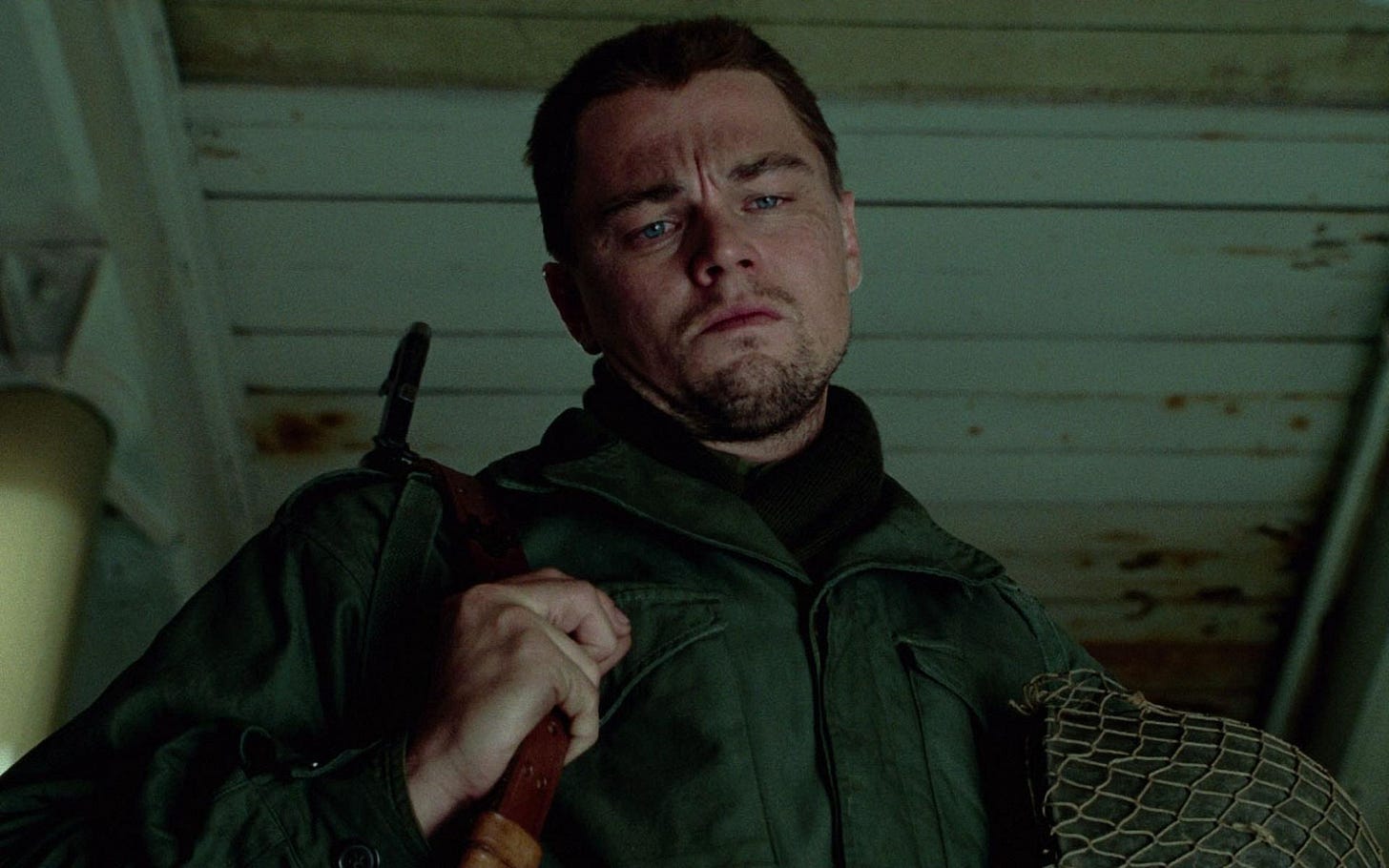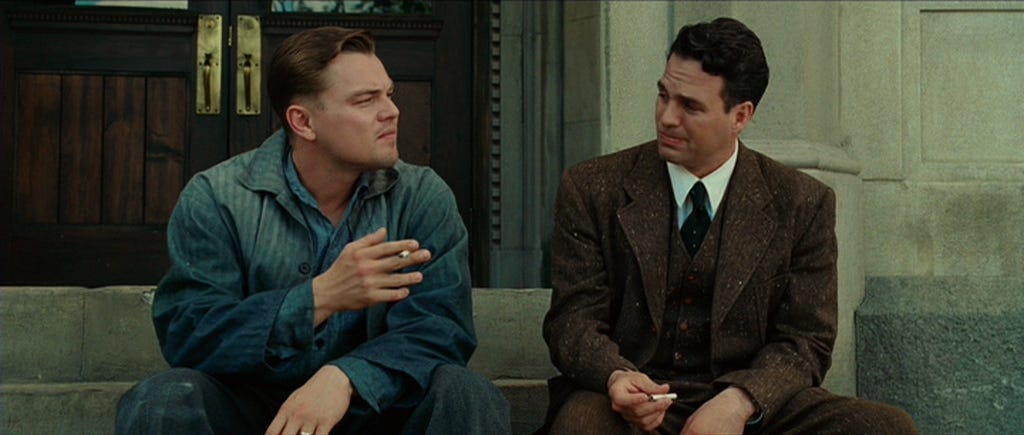Shutter Island
Which would be worse, to live as a monster or to die as a good man?
Last week, I saw a clip from Shutter Island on Twitter, and it reminded me of what a mind-twisting movie it is. I felt inspired to write about it, and after googling it, I found out that today is actually the 14th anniversary of the film's premiere. Shutter Island was based on a book of the same name by Dennis Lehane. While there are many differences between the novel and Martin Scorsese's film, the overall theme is the same: how far will people go to reframe their reality to avoid facing their demons?
I remember watching Shutter Island around the time it came out, but only years later did I actually understand its message. Scorsese's film has viewers questioning who they can trust, what is actually going on, and how much of what they were told throughout the movie is actually true. The story is told by a very unreliable narrator, though by the end, a lot of people still question if maybe part of what the main character, Teddy Daniels, was saying was true after all.
Shutter Island is by far the most complex film I've ever covered on Movie Mondays, and it has one of the biggest plot twists of any movie I've ever seen. However, this is what makes the movie so compelling and exactly why I knew I had to rewatch it and analyze it for this week's newsletter.
Teddy's Personal Reality
We are introduced to Leonardo DiCaprio's character, US Marshal Teddy Daniels, at the beginning of the film when he is on a ship with his partner Chuck Aule (Mark Ruffalo), and they are on their way to an asylum on Shutter Island to find a missing patient named Rachel Solando. However, as anyone who has seen the film knows, there is no Rachel Solando, Teddy Daniels, or Chuck Aule.
Teddy's real name is Andrew Laeddis. He's a patient at Shutter Island, and he's there because he murdered his wife after she drowned their three children in the lake by their house. While we don't find this out until the end of Shutter Island, this is the driving force behind the entire film. Teddy can not face what he did, so instead, he creates a false reality where he paints himself as the hero who is searching for a missing patient instead of accepting that he is actually the villain of the story.
“I need to know you’ve accepted reality,” -Dr. Cawley, Shutter Island.
I'm incredibly fascinated by the inner workings of the human brain and what we are capable of. Anyone who's studied the brain knows that whatever you repeat to yourself over and over again will become your truth. In Teddy's case, he was able to feed his brain a story that, from his perspective, changed the reality in which he was living.
However, there are many aspects of Teddy's true reality that the character is aware of. He knows he had a wife who died, but in his mind, he believes his wife was murdered in a fire started by Andrew Laeddis. Teddy knows Laeddis is a patient at Shutter Island, and he sets out to find him because he's so angry that he killed his wife. What he doesn't realize is that he actually is Laeddis. Teddy disassociated from himself, projecting Laeddis as a villain outside of himself so that he could project his anger onto another person instead of taking responsibility.
By the end of Shutter Island, the truth has been revealed, and Teddy either has to accept what he did, which he initially does, or get a lobotomy, which he ultimately ends up enduring. However, this is where many viewers have questioned what actually is the truth. When Teddy was talking to who he believed was Rachel, she warned him about the dangers on Shutter Island and he had many interactions with doctors that suggested he knew something sinister was going on. As we know, lobotomies were incredibly dangerous and inhumane, which is why Teddy wasn't wrong to believe that the doctors on Shutter Island were villains trying to hurt him.
While Chuck, who was actually one of Teddy's doctors, named Dr. Lester Sheehan, and Dr. John Cawley believed Teddy could be healed if they could convince him to accept his true story, Dr. Naehring believed Teddy was beyond help and needed to be lobotomized because of his violent behavior. Teddy was untrusting of Dr. Naehring because he's German, and Teddy was a former World War II soldier who linked Naehring to the possibility of German mind control. Even as Teddy is leaving to get his lobotomy at the end of Shutter Island, it's still unclear how much of his story is true and what is made up, considering the final line of the film comes from Sheehan, who calls out the patient's name, saying "Teddy," instead of "Andrew" what we were told is his real name.
Mental Illness In Shutter Island
Mental illness ties into Teddy's perception of reality in Shutter Island and also links to his wife's death. Though it's unclear exactly what mental illness Teddy is experiencing throughout the film, he seems to have severe PTSD from World War II. After the war, Teddy began drinking a lot, and because he had so much trauma that he didn't want to deal with, he buried it while also avoiding his wife's condition.
Teddy's wife, Dolores Chanel, suffered from manic depression, and she made it clear to Teddy that she had a mental illness when she told him she had a bug in her brain. However, Teddy did nothing to help her, even after she intentionally set their apartment on fire. Instead, Teddy moved his family to a lake house, where Dolores' condition worsened, and she ultimately drowned their children.
“I wish I could just let you live in your fantasy world”-Dr. Cawley, Shutter Island.
Teddy admits at the end of the film that he feels guilty for his children's deaths because he feels like had he helped his wife, she wouldn't have killed their kids. The grief and guilt Teddy experiences are major factors in why he keeps making up a false reality in which he is a hero.
World War II Flashbacks
Teddy's PTSD is evident in his many World War II flashbacks, which seem to be an effect of him going off the medication he's been on for two years. Teddy was one of the WWII soldiers responsible for the Dachau liberation, and in his flashbacks, he remembers watching a commandant suffer after a botched suicide attempt, lining up the SS guards and shooting them dead, and arriving too late at the camp to save all of the victims. There are very graphic shots throughout the flashback scenes, one in which some of the holocaust victims are piled up in the snow.
Unfortunately, because Teddy is such an unreliable narrator, we're not sure how many of these flashbacks are true; even Teddy's doctor questions if he actually shot the guards or not. However, a lot of this ties into the tragedy of Teddy's wife and children's deaths. The Holocaust victims represent Teddy's children, who he showed up too late to save. He feels responsible for the victims' deaths because the soldiers didn't get to the camp in time to save everyone, and he feels responsible for his children's deaths because he didn't come home in time to save them and he didn't help his wife, which also would have saved them.
The justification for killing the soldiers is that they deserved to die because of the atrocities they committed at the camp. We might not know for sure if Teddy shot the soldiers, but we do know that he shot and killed his wife. Similar to how the soldiers' deaths are justified, Teddy seemed to think it was okay to kill his wife because she murdered their children. Teddy also seems to believe the doctors at Shutter Island are torturing patients the same way Holocaust victims were tortured.
Interpretations Of Shutter Island's Prominent Quotes
At the end of Shutter Island, before Teddy leaves for his lobotomy, he asks Chuck, "Which would be worse, to live as a monster or to die as a good man?" This and so many other quotes in the film hold great significance.
"Remember us, for we too have lived, loved, and laughed."
This quote is displayed on a plaque at the start of the film and feels like one that connects Shutter Island to Dachau more than any. Whether we are referring to the Holocaust victims or the patients at Shutter Island who may or may not be enduring torture from the doctors, we are being asked to see everyone as a human who once lived with great joy before being imprisoned.
"The law of 4. Who is 67?"
This is written on a piece of paper that Teddy thinks Rachel has left behind. As we know, there is no Rachel, and the truth is Teddy wrote the note. The law of 4 refers to four names: Edward Daniels, Andrew Laeddis, Rachel Solando, and Dolores Chanel. Edward Daniels is an anagram for Teddy's real name and Rachel Solando is also an anagram for his wife Dolores' real name. 67 refers to the 67th patient, who is actually Teddy.
"The brain controls pain. The brain controls fear, empathy, sleep, hunger, anger. Everything. What if you could control it?"
This quote is spoken to Teddy by who he believes is Rachel Solando. This quote is so powerful because it tells the audience the truth about Teddy, but at the time, it seems Rachel is referring to the doctors who are trying to control the patients' minds. I love it when a movie hands the truth right to the audience, but we still don't put two and two together until the end.
"Which would be worse, to live as a monster or to die as a good man?"
Teddy's final line in the film is by far his most powerful. After Teddy seems to accept his reality as Andrew Laeddis, he goes right back to pretending to be Teddy Daniels. Dr Sheehan knows this means Teddy must get a lobotomy, and while it seems Dr. Naehring was right and Teddy can't be healed, this line reveals Teddy might not be delusional after all. Teddy compares getting a lobotomy to killing his old self. He would rather let Teddy Daniels, a good man, die than accept that he is the monster who allowed his wife to murder their kids, and later murdered her, and live his life with this knowledge.
Shutter Island is certainly mind-boggling, and because Leonardo DiCaprio is such an incredible actor who fully takes on the identities of his characters, Teddy was able to convince viewers his perspective is true, so much so that by the end of the film, we still question if maybe he is telling the truth. In my opinion, it seems like the doctors are probably right, though Sheehan's final line, calling Andrew Teddy, is the one thing that stands in the way of me fully trusting the doctors. It seems the end of Shutter Island is left open to interpretation. Though one could argue Teddy was never crazy, and the whole film was just his interpretation of what was really going on at Shutter Island.









I NEED to rewatch IMMEDIATELY